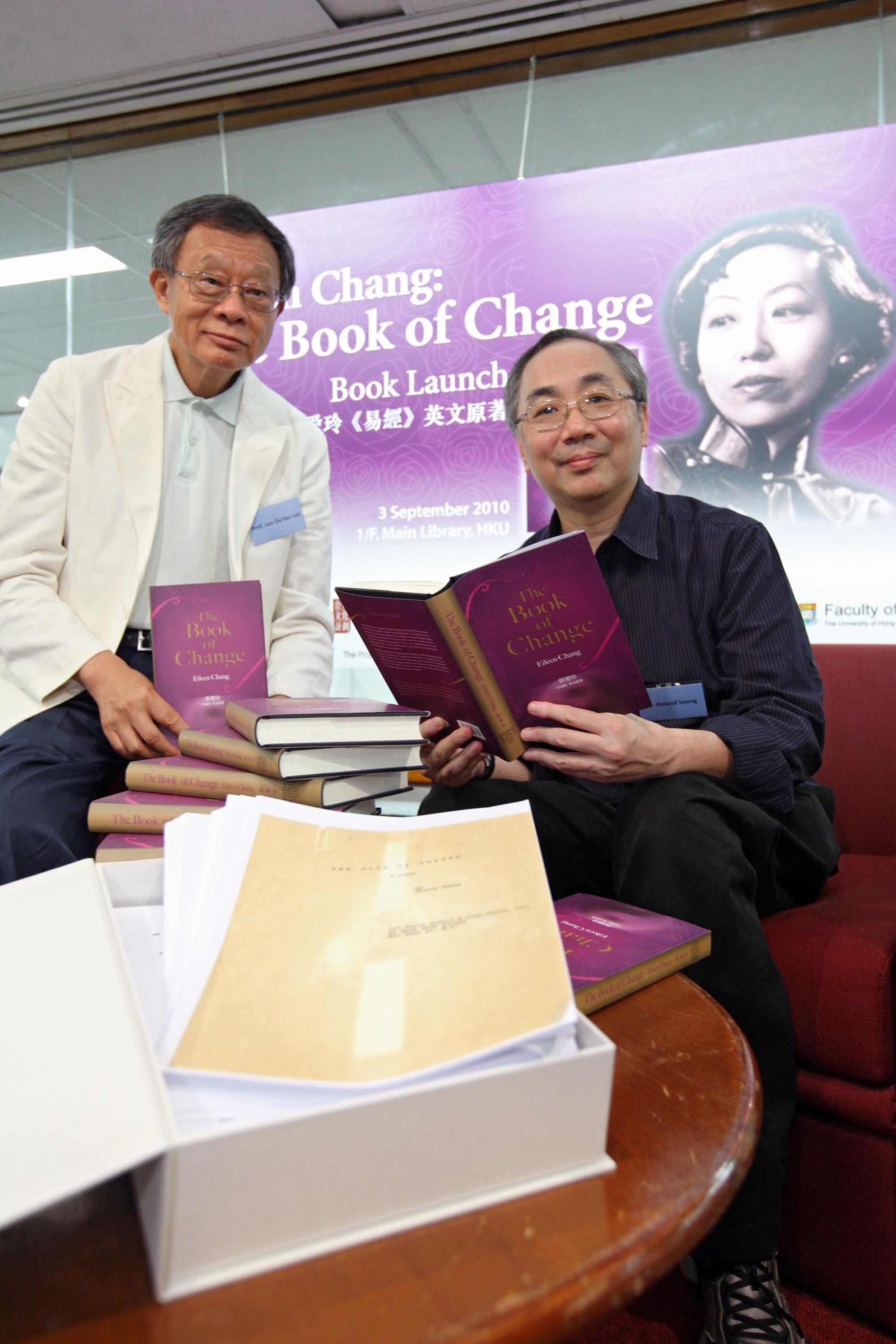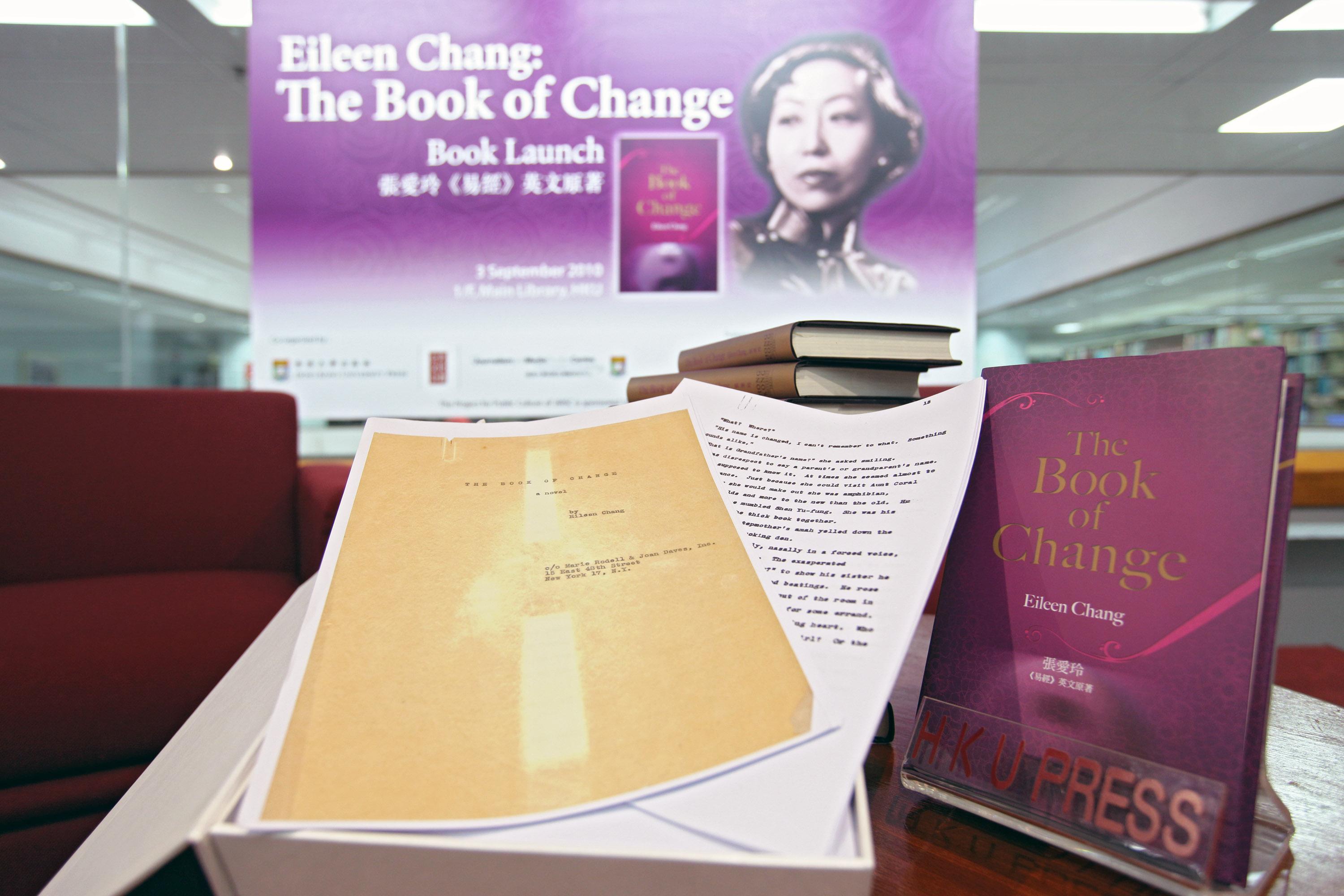Media
Book Launch on Eileen Chang's The Book of Change
03 Sep 2010
|
The Hong Kong University Press and University's Project for Public Culture of Journalism and Media Studies Centre , HKU co-hosted a book launch for a noted contemporary Chinese writer, Eileen Chang's (1920-1995) semi-autobiographical novel The Book of Change《易經》today at HKU, the book launch also marks the 90th birthday and 15th anniversary of Chang's death. The Book of Change was written in English, likes its prequel, The Fall of the Pagoda, depicting Chang's childhood in Tianjin and Shanghai. It provides a first-hand account of life in wartime Hong Kong following the Japanese invasion, with scathing details of widespread cowardice, as well as inspiring examples of human resilience. Eileen Chang (1920-1995) arrived in Hong Kong from Shanghai in 1939 and enrolled in the University of Hong Kong. Her childhood in Shanghai was a gothic horror tale in which she finally ran away from her father and stepmother. Her student life in Hong Kong was a happy interlude, but Chang soon found herself stranded by the war. The Japanese occupation of late 1941 provided many brutal lessons on the fragile nature of personal attachments. Dr Roland Soong, executor of Eileen Chang's estate, HKU's Pro-Vice Chancellor, Professor S.P. Chow and renowned scholar Professor Leo Ou-fan Lee attended the book launch. Professor Chow congratulated Hong Kong University Press for delivering this incredible project after publishing Chang's first part of her semi-autobiographical novel, The Fall of the Pagoda in April. Professor Chow also expressed his thanks to the Project for Public Culture at HKU's Journalism and Media Studies Centre, which started its Eileen Chang Project three years ago and has worked hard to bring Eileen Chang back home to HKU. The Book of Change is the second part of Chang's English which depicts lively wartime HK and the protagonist also bears a large resemblance to Chang during her student life at HKU from 1939 to 41. At the launch, Dr Roland Soong donated a photocopy of the manuscripts of Eileen Chang's English novel The Book of Change to HKU. Last year, Dr Soong donated one million dollars to set up the Eileen Chang Memorial Scholarship in her memory, Ms Yang Zhi Yan, who received the second ever scholarship to study at the Faculty of Arts also attended the book launch. Dr Soong shared his views of The Book of Change saying that Eileen Chang initially wanted to publish it as a literary work when it was completed in 1963. "By publishing it today, we offer readers the choice to decide on its literary merits. But I believe today that the book is just as important as a historical document about Eileen Chang. The 1964 The Book of Change stands between the 1944 From the Ashes and the 1976 Small Reunions and gives us an intermediate point in her evolving thoughts and attitudes about the events in her own life." He also said, "Beyond the particularity of this author, this book contains the observations by a certain Hong Kong University student during the one and only time that Hong Kong was wounded by the trauma of war. This Hong Kong University student hailed from Shanghai and therefore had an outsider's eye for things. She wrote down and reflected continuously on what she saw, leaving us with a legacy that continues to touch and influence us even today." Professor Leo Lee, renowned scholar and cultural critic, analyzed the book. He said The Book of Change is proof that Eileen Chang is an international writer in the literary landscape. "This is a near-masterpiece," he added and recommended that it should be a required reading for every student in the Faculty of Arts. Dean of the Faculty of Arts, Professor Kam Louie, said that The Arts Faculty has housed some very talented and famous writers in the last hundred years. Eileen Chang has been one of them. "I am overjoyed that HK University Press has been able to publish her The Book of Change which describes that part of her life with HKU as background." Eileen Chang (1920-1995) is now recognized as one of the greatest modern Chinese writers, though she was completely erased from official histories in mainland China. She was the most popular writer in Japanese-occupied Shanghai during World War II, with English and Chinese stories focusing on human frailties rather than nationalist propaganda. At the launch, Professor Ying Chan, Director of Journalism and Media Studies Centre announced the forthcoming Eileen Chang public exhibit to be held from 17 until 19 September in the Galerie Klee-Yushi House on Caine Road, Central, with 6 guided tours by Dr Roland Soong. Entitled "Eileen Chang Uncovered", the exhibit will showcase original manuscripts of Chang's work, including the handwritten manuscript of her recent Chinese and English publications : The Book of Change, The Fall of the Pagoda and Private Sayings of Eileen Chang 《張愛玲私語錄》Sayings, Strange Country《異鄉記》, and a never published English short story. Also on display are Chang's forever best friends Soong Qi couple's correspondences with Chang, photos and personal works. The Book of Change can be ordered at: http://www.hkupress.org/book/9789888028207.htm ~ "Chang is quick to tell us she is one of those people she sets out to satirize: first shocked by the disorder of war, yet becoming accustomed to the new order of life in a short time... what concerns her most is food. She calls attention to people's grotesque behavior and ‘bizarre wisdom' inspired by the instinct to survive. Physical intimacy, like food, becomes a poignant index to convey the primordial needs of humanity." From the introduction by David Der-wei Wang, Harvard University For enquiries, please contact : Ms.Velentina Ma, Journalism and Media Studies Centre, HKU at [email protected] or tel: 2219 4012 / 9123 0252 The book launch is also supported by HKU Libraries and Faculty of Arts, HKU. Project for Public Culture of JMSC is sponsored by the Azalea(1972) Endowment Fund. |
 Professor Leo Ou-fan Lee and Dr Roland Soong at the book launch  Dr Roland Soong donated a photocopy of the manuscripts of The Book of Change to HKU |
